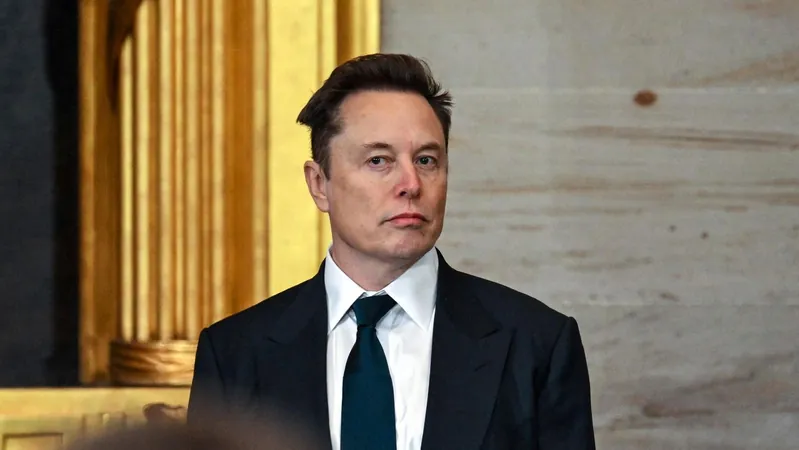
Billionaires, Including Elon Musk, Decry Trump's Tariffs as a Catastrophic Policy Error
2025-04-08
Author: Ling
In a surprising turn of events, some of the billionaire backers of former President Donald Trump, such as Tesla’s Elon Musk, have voiced strong opposition to his recent tariff policies, which have significantly disrupted global financial markets. Their concerns center around the potential long-term damage to the economy stemming from Trump's high tariffs.
The Cost of Tariffs
The impact of Trump’s controversial tariffs became glaringly evident when, on an alarming Thursday alone, the top ten billionaire donors to Trump faced a staggering loss of over $10 billion in the stock market. This diastrous day was only part of a much larger trend, with Forbes estimating that global billionaires collectively saw $270 billion evaporate from their net worth. High-profile figures such as Mark Zuckerberg, Jeff Bezos, and Larry Ellison were among the hardest hit, grappling with significant declines in their wealth.
A Family Concern
In a poignant critique, Kimbal Musk, brother of Elon Musk, labeled Trump as 'the most high tax American President in generations,' articulating on X that Trump's tariff strategy is a detrimental structural tax imposed directly on American consumers.
Trump's Stance
Despite mounting criticism, Trump remains steadfast in his support for the tariffs, describing them as essential for reorganizing America’s trade relationships. He argued in a post on Truth Social that the U.S. has an urgent opportunity to make necessary changes that have been long overdue. His defiance is underscored by remarks made in the Oval Office, where he asserted, 'This is our chance to reset the table,' dismissing the economic turmoil as a temporary hurdle.
Dissent from Allies
The backlash is not limited to billionaires; other Trump allies and supporters have also started to raise alarms. For example, Dave Portnoy, the owner of Barstool Sports, reported a dramatic decrease in his wealth due to the market nosedive, referring to the impact of the tariffs as 'Orange Monday.' Podcaster Joe Rogan and conservative commentator Ben Shapiro also criticized the trade war, with Shapiro describing the chaotic approach to tariffs as 'problematic.'
Republican lawmakers, traditionally aligned with Trump's agenda, have voiced apprehensions regarding the economic consequences of his tariff strategy. Senator Thom Tillis and Senator Ron Johnson have both expressed concern regarding the potential for companies facing bankruptcy due to the administration's policies. Meanwhile, Rand Paul revealed that many GOP members have confided in him, urging him to continue criticizing the tariffs, though they themselves remain publicly silent due to political pressures.
Potential for Change
In a surprising twist, Trump hinted at the possibility of negotiating with other nations regarding tariffs, indicating that discussions would commence immediately to establish 'fair deals.' However, Treasury Secretary Scott Bessent cautioned that such negotiations could take time, with other nations eager to engage in talks, suggesting a lengthy process ahead.
Congress also holds the power to overturn Trump's tariffs. Bipartisan legislation requiring congressional approval for any tariffs is currently on the table, but its passage remains uncertain. A legal challenge from a Florida-based stationery company also questions Trump’s authority to impose tariffs, suggesting that the legal landscape surrounding his trade policies could become contentious.
Contextual Background
Trump’s tariff measures, introduced during a 'Liberation Day' event, impose up to 10% tariffs on imported goods from nearly all foreign nations— even uninhabited territories. This move reflects Trump's long-standing ambition to revitalize U.S. manufacturing and penalize countries he views as engaging in unfair trading practices. However, numerous economists have warned that such policies will likely lead to increased consumer prices in the U.S. and adversely affect the economy.
In a world where billionaires previously backed Trump’s bid for presidency, the recent backlash against his tariff strategy marks a notable shift, raising questions about the future direction of his economic policies as they continue to unfold and impact the market landscape.
Stay Tuned for Updates!





 Brasil (PT)
Brasil (PT)
 Canada (EN)
Canada (EN)
 Chile (ES)
Chile (ES)
 Česko (CS)
Česko (CS)
 대한민국 (KO)
대한민국 (KO)
 España (ES)
España (ES)
 France (FR)
France (FR)
 Hong Kong (EN)
Hong Kong (EN)
 Italia (IT)
Italia (IT)
 日本 (JA)
日本 (JA)
 Magyarország (HU)
Magyarország (HU)
 Norge (NO)
Norge (NO)
 Polska (PL)
Polska (PL)
 Schweiz (DE)
Schweiz (DE)
 Singapore (EN)
Singapore (EN)
 Sverige (SV)
Sverige (SV)
 Suomi (FI)
Suomi (FI)
 Türkiye (TR)
Türkiye (TR)
 الإمارات العربية المتحدة (AR)
الإمارات العربية المتحدة (AR)